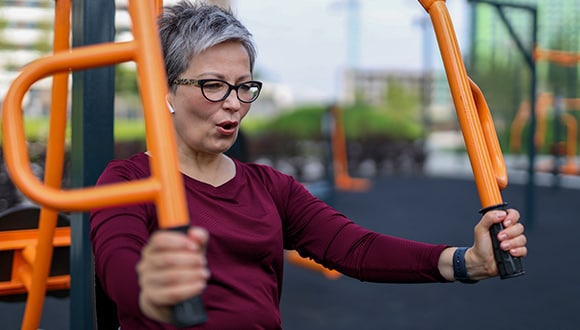Fit over 50: How to find your fitness motivation
Updated April 2025 | 5 min read
Expert contributor: Katie Morris, Exercise Physiologist and HCF Health Coach
Words by Sabrina Rogers-Anderson
If you can’t seem to muster your enthusiasm when it comes to an exercise routine, here’s how to get (and stay) motivated.
Life is one big adventure for 65-year-old Di Westaway. More than 25 years ago, she took on a wilderness challenge that changed the course of her life.
“When I was approaching my 40th birthday, I went through a phase where I felt miserable,” she says. “I was sacrificing a lot, prioritising my husband’s work and being there for my young kids, who were seven and five at the time. I felt like I had no time to myself.”
So, when her personal trainer invited her to climb Mt Aconcagua in Argentina – the highest mountain in the Southern Hemisphere – she took a leap of faith. The trip was so tough and she didn’t reach the summit, but it was a life-changing experience.
It inspired Di to launch an organisation that trains women for trekking challenges in iconic destinations all over the world. Since then, she’s helped raise more than $51 million for eye health charity The Fred Hollows Foundation, as well as Beyond Blue and the Heart Foundation.
“Adventure taught me mental toughness and helped rejuvenate me,” says Di. “It also gave me the power and strength to go on [despite facing tough times].”

Exercise after 50: how to set realistic goals
Women’s bodies and minds can go through dramatic changes in their 50s.
"In addition to hormonal changes associated with menopause, women start to lose muscle mass and bone density,” says Exercise Physiologist and HCF Health Coach Katie Morris. “Strength training is the best way to preserve and build muscle mass and bone strength. Ideally, women in their 50s should strength train three times a week and do cardiovascular exercise like walking, swimming or group fitness two to three times a week.” Remember to check with your GP before you start any new fitness program or new exercises.
But knowing where to start can be intimidating, particularly if you’re new to exercise. Katie recommends setting realistic goals that work with your lifestyle so you’re more likely to stick to them.
“Figure out a fitness goal you’d like to achieve,” she says. “Everyone is different, so maybe for one person the goal is to go from walking to the letterbox to walking for an hour, while for someone else it’s going from running 5km to running 20km. The important thing is to not compare yourself to others and to make sure your goal is achievable. Ask yourself what you can realistically get done each week depending on your work and other commitments.”
Once you’ve set your goal, Katie suggests the following ways to get there:
- Break your goal down into smaller parts: “It can be helpful to write out a plan and stick it to your fridge,” she says. “If your big goal is to walk 10km, you might start by walking 2km the first week and increasing it by 1km each week. You can tick off each milestone, which can be very motivating.”
- Take it slowly: “Don’t be tempted to increase your training load too quickly,” says Katie. “Give yourself the time you need to reach your goal.”
- Keep challenging yourself: While it’s important not to take on too much too soon, you also don’t want to make things too easy. “If you do the exact same walk every day, your body will get used to it and you won’t get the same benefits,” Katie explains. “Take a different route every day or add some hills or stairs.”

6 ways to find your fitness motivation
Whether you’re over 50 or even older when you take up exercise, it’s never too late to reap the benefits in your everyday life. Not only will it improve your heart health, muscle mass and bone density, but it will help you keep a range of illnesses at bay and help you get the most out of life.
“You’ll have more energy and vitality to do things like weekend hikes, travelling or playing with your grandkids,” says Katie.
Here are Katie’s top tips to kick start your exercise program:
1. Schedule exercise into your week
Book your workouts into your weekly schedule in the same way you would a doctor’s appointment or a coffee date with a friend.
“Plan your week ahead and which days you’ll exercise,” says Katie. “You can do it in your head or write it down in your planner or online calendar. Having a plan keeps you accountable and makes you less likely to skip exercise.”
Katie also suggests combining social activities and exercise. “Instead of sitting at a café with a friend, grab a coffee and go for a walk,” she explains.
2. Make it enjoyable
“Pick an activity you enjoy, because you won’t do it if it feels like a chore,” says Katie. “Try walking, swimming, tennis, group fitness or other activities until you find one you love.”
You can make any workout more pleasant by listening to music, a podcast or an audiobook.
“Many of us lead busy lives, and exercise can be much-needed ‘me’ time,” Katie notes. “Listening to something you enjoy while you work out can be really motivating.”
3. Find a training buddy (or buddies)
Having someone to exercise with you can boost your fitness motivation. “Meet a friend for a fitness class, ask your partner to go for a walk with you after dinner or get your teenagers off their screens and onto their bikes,” suggests Katie. “If you have an exercise date with someone, you’re more likely to go because you don’t want to let them down.”
Some gyms and community centres also offer social activities after fitness classes.
“At my gym, there’s a coffee get-together after the aqua fitness class,” says Katie. “Many people go multiple times a week to get their exercise in and see their friends. It’s a huge drawcard.”
4. Harness the power of technology
Using a fitness app like HCF Healthful can help you plan and track your activity for the week.
“It’s particularly helpful if you’re a visual person,” says Katie.
She also suggests trying a step tracker or smartwatch. “Mine beeps at me every hour if I haven’t gotten up from my desk, so it keeps me accountable,” she says. “I often tell my clients to check their steps in the afternoon and, if they’re not where they want to be, to go for a walk to get their steps up.”
5. Don’t forget about incidental activity
Incidental activity refers to any activity built up in small amounts over the day. Every little bit of movement contributes to improving your health.
“You can incorporate movement into your workday with walking meetings, taking the stairs or going for a walk on your lunch break,” says Katie. “Or take your kids or grandkids to the park and kick a soccer ball around. Gardening and cleaning can also be quite physical if you really get into it. Do your best to sit less and move more.”
6. Reward yourself afterwards
When you reach a fitness goal, reward yourself with something other than food.
“Have a day out on the weekend, go see a movie or have a massage,” suggests Katie. “It’s important to acknowledge your progress and accomplishments so you stay on track.”
HCF Healthful rewards eligible members when you complete your health risk assessment and get your Health Score for the first time.
Get going, keep going with HCF Healthful
Our new health and wellbeing app, HCF Healthful, makes managing your health feel doable, no matter where or when your journey begins*. With HCF Healthful, receive a personalised Health Score so you can get a real-time snapshot of your health and know what areas of your wellbeing need more focus. Complete activities, goals and achievements that have been customised to your key improvement areas with the guidance of a 24/7 digital coach.
Related articles
Why is it hard to lose weight after 50?
As you get older, you may notice your body has changed and it’s harder to lose weight.
How to set a health daily routine
It doesn’t have to be a new year for many of us to want to create routines for better health, sleep and fitness. Here’s how to make it happen.
A guide to private health cover for over 50s
Growing older brings unique health considerations. Here’s what you need to know about having private health cover in your 50s and beyond.
Exercise over 50: work smarter, not harder
Ready to start moving but not sure how? Use these tips to help make the most of exercise over 50 and beyond.
Important Information
* Must have an active HCF hospital and/or extras cover. Excludes members on Overseas Visitor Health Cover, Accident Only Basic and Ambulance Only policies.
This communication contains information which is copyright to The Hospitals Contribution Fund of Australia Limited (HCF). It should not be copied, disclosed or distributed without the authority of HCF. Except as required by law, HCF does not represent, warrant and/or guarantee that this communication is free from errors, virus, interception or interference. All reasonable efforts have been taken to ensure the accuracy of material contained on this website. It’s not intended that this website be comprehensive or render advice. HCF members should rely on authoritative advice they seek from qualified practitioners in the health and medical fields as the information provided on this website is general information only and may not be suitable to individual circumstances or health needs. Please check with your health professional before making any dietary, medical or other health decisions as a result of reading this website.